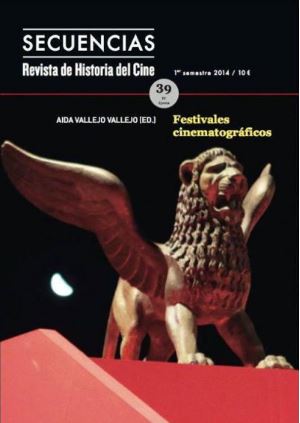Prestigio de la nación vs mirada deconstruyente: las imágenes de Italia en el Festival Internacional de Cine de Venecia desde el final de la Segunda Guerra Mundial hasta el "milagro económico" / Nation’s Prestige vs Deconstructive Gaze: The Images of Italy since the End of the Second World War until

This work is licensed under a Creative Commons Attribution 3.0 Unported License.
Abstract
El presente artículo pretende investigar qué tipo de imágenes sobre Italia surgieron en el Festival Internacional de Cine de Venecia en el periodo comprendido entre la segunda posguerra europea y los años del llamado «milagro económico». En esos años se abrió una contradicción entre los éxitos conseguidos por las películas italianas –sobre todo en el extranjero– y la imagen de pobredumbre socieconómica que esos films transmitían. El político más influyente para la industria cinematográfica italiana en ese momento, el democristiano Giulio Andreotti, osciló entre el reconocimiento del valor comercial, cultural y diplomático de aquellos éxitos, pese a que las películas retrataban un país pobre, y la irritación explícita por su proyección en Italia y en el extranjero, hasta el punto de intentar censurarlas. Un análisis de la Mostra entre la segunda mitad de los años50 y la primera mitad de los 60, con su función de escaparate del «milagro económico», no permite conformar una única imagen de Italia. Por un lado, el festival de 1959 fue decisivo para relanzar el cine italiano, tanto dentro del país como en el extranjero, por el premio concedido a El general de la Rovere (Il generale dellaRovere, Roberto Rosellini) y a La gran guerra (La grande guerra, Mario Monicelli), films que contribuyeron a la promoción de una imagen indulgente de los italianos, representados como astutos y sin embargo buenos, oportunistas pero, en el fondo, buena gente. Por otro lado, la Mostra no solo encumbró ese proceso de desarrollo económico y de modernización que atravesaba Italia; al mismo tiempo –y sobre todo– promovió una representación más problemática del país, de su pasado y de su presente.
Palabras clave: Festival Internacional de Cine de Venecia, imágenes de la nación, cine italiano, posguerra, neorrealismo, milagro económico.
Abstract
This article intends to investigate what kinds of Italy’s images emerged at the Venice International Film Festival from the second postwar to the years of so-called «economic miracle». In postwar years there was a conflict between the national prestige for several successes – mostly abroad – and the image of socio-economic poverty that those films built. The most powerful politician in the Italian cinematic industry at that time, the Christian Democratic Giulio Andreotti, alternated between acknowledgement of the commercial, cultural and diplomatic value of those successes, even though films focused on a poor country, and the explicit annoyance for their screening and the consequent attempts to censor those, both at home and abroad. Concerning the «Mostra del cinema» from the second half of 1950s to first half of 1960s and its function of «economic miracle» showcase, it is not possible to define one and only image of Italy. on the one hand, the «Mostra» was essential in 1959 to launch again Italian cinema at home and abroad thanks to prize-giving of Il generale della Rovere (RobertoRosellini) and La grande guerra (Mario Monicelli) and this way it helped to promote an indulgent image of Italians, who were sly but nice, opportunist but ultimately good folks. on the other hand, the «Mostra» not only exalted that process of economic expansion and modernization Italy passed through, but also – and especially –promoted a more problematic and deconstructive representation of the country, both of its past and present.
Keywords: international film festivals, images of nation, Italian cinema, postwar period, neorealism, economic miracle

